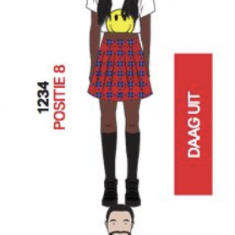Boris Surya is a Croatian scientist who likes to do a lot of different things. His passion is studying the behavior of people and how they react to things and what he can do to manipulate that. He gave his speech after the lunch break. I saw him before that time concentrating with his headphones on and watching his story on the computer. I decided to take a picture from him and tweet it. After his presentation he did retweet. I just wanted to see what his behavior would be to this intrusion ;-) in the end he’s all about observing people with cameras. ;-) Great sport !

Anyway, he’s on stage and presents us a fun video how terrible ecommerce is when it comes to client service. By putting all our “secure technologies and behaviors” in the offline world, we see how off-putting it all is. And how non-human. See it here.

He said that he was intrigued by how churches are affecting our will. How does the building, the rituals, the art etcetera force us into following. Wonder if he also studied that for mosques. He also was interested in why museums make us tired and how placeboes make us sick. And of course this lead to him having a startup Monolith in Amsterdam that is in fact studying retail space and how it influences us in our buying decisions.
This study is not about the numbers, but about what happens in the store. His fair claim is, that most store managers are managing on output. It is like judging a movie but just watching the credits after the movie is over. It doesn’t give you a clue about what it is. Still the majority of managers only focus on the numbers, without ever touching the retail floor. Interesting to know that for instance at H&M most marketing people once worked in the stores before they were accepted as marketing staff. Kudos!

The best advice he could give us, is invest in people and your audience. The magic does not exist. It is something that is co-created by the magician and the audience. As for stores: they’re just black boxes. Boris compares it to going to the moon. You had artists who dreamt and wrote about it. You needed the scientists to make it happen. I dare to add, that those that made it happen were more dreamers than scientists. Otherwise they would not have had the wings to be persistent enough.
He introduced us quickly into the world of behavioral sciences and that of sensors. He claimed that at the kickstarter events more and more initiatives are launched around sensor technology. More importantly he claimed that we’re in the middle of a shopper revolution. One bad review has the power of twenty good ones. Ask a lot of the big corporations how it affects them, and why they’re in a constant cramp and defense position. They’re paralyzed often to try new things, as they’re scared of this mechanism. Even organizations like EU have pretty much lost their credibility, and invest in “positive blogging” about them, to pretty much manipulate the population. So they need to work twenty times harder than every critic that is launched at them.

The consumer is spoilt (really?) and demands more and more. We need to look for disruptive retail. Think completely out of the box, keep the consumer at center thought and find new ways to seduce them. He also gives fun examples why as a salesperson, you should always focus on the boy and not the girl. The boy needs more entertainment and action. He wants to leave the shop as soon as possible (unless there are cool gadgets, guns or cars on stock) and the girl wants to stay anyway. So entertain the boy. Also he told the secret, that if there is nobody in store, only sales force, everybody should look busy and focus on anything but the customers. They will otherwise not enter, as nobody likes to have all eyes pointed at him/her, unless you’re a drama queen.

Boris’s team does behavioral research within real shops and outside of shops using sensor technologies and hidden cameras. He shows us what this technique provides. Heat maps, routing in the shop, visitor measurement and more. He tries to find where the problems are situated and what to do about it. He believes that the solution should be sought for in a more or less holistic way. During his talk he went as far as too claim that people are lazy and do not like to make an effort by reaching for top shelves. He suggests a solution like writing “reach for the sky” on the top shelf, so people feel they need to fulfill this vision. Kind of.

If the navigation in the store is not clear, people will leave, even females. It’s like an online shop. If it becomes a maze, most people get scared away, they will not trust it and feel confused. Online he suggests that things like “loading” and other forms of waiting in stores are killing commerce. Why not entertain people when they’re waiting or suggest other things. It’s a bit like waiting for a free cashier and you can still watch chewing gum, candy bars and some terrible trash piled up one on another at the cash register.

Sometimes you can give people the idea that something is exclusive, but discourage people to actually make a purchase. For instance, expensive watches or pens, you can put behind glass. That way, it looks expensive, you cannot reach for it. At the same time, it will take away the appetite to buy it. It might be better, even if the value is too high and you’re afraid to it being stolen, to remove the glass. It will sell better that way. People can touch it, it’s within reach. (I suggest to carefully watch the hood you’re in).
Conclusion of his speech: feel fee to ignore the shopper. He will ignore you as well in the end.

You’re always welcome at Prinseneiland. Call us and reserve time for a first date. 020-6933131 or mail richard@iizt.com










